I would have never guessed I’d one day find myself waking up in Africa. After months of planning and years of dreaming, I have at last arrived in Accra, Ghana! It’s currently 6:36 p.m. of day three, and already I feel as though so many things have happened. I’ll be keeping a daily journal to remember this entire trip, and over the course of the next six weeks, plan on cranking out blog posts to summarize several days worth of events. I’m hoping I can stay on track; the days are often busy and eventful, and nights exciting and distracting.
It first hit me that I was indeed headed to Ghana on the plane ride over from NYC – JFK. A Ghanaian woman needed help stowing her luggage in the overhead bin, so I lifted it up for her since she was rather old and most likely pretty weak. After completing this simple task she said,
“Thank you, thank you. God Bless. Thank you, thank you.”
Once simple job and suddenly I was the Queen of England. It was strange to receive so much praise and thanks for such a minor task. There was a deep sincerity in her voice, as I’ve now witnessed with most Ghanaians.
Myself and those I had traveled with (eight of us total) arrived in Ghana around 1:30 p.m. (thankfully I slept most of the flight), and made our way through the airport and customs. Luckily we had no problems and all bags were recovered, but that first step off the plane felt as though I walked into a sauna. The heat here is intense. Strangely enough, I was expecting worse, but I best relate it to an east coast summer. If you’ve ever spent time on the east coast during July or August (I visit Pennsylvania every summer to see family), you’ll know that it reaches high temperatures with rather extreme levels of humidity. This heat persists throughout all hours of the day in Ghana – daily life is uncomfortable, but not unbearable. It cools off during evenings, but all buildings retain the heat and humidity, which makes sleeping somewhat gross. Apparently it takes a few days to adjust….so I’m praying that happens soon. I’m growing tired of breaking a sweat from walking up the stairs in my house. Waking up in your own sweat isn’t all that fun, either.
Our group found the program director and exited the airport in pursuit of the van. Never have I felt more out of place in my entire life. Ghanaian men fixated on our every move, observing how we looked, walked, and acted. Their firm, unwelcoming glares accompanied with an over-the-top assertiveness to help one with their bags made for a very unsettling walk to the car. These men are merely looking to make a few bucks, but you either have to completely ignore them or basically scream at them before they’ll back off. A simple ‘no thanks’ only stalls them for a moment or two, and before you know it they’re grabbing your suitcase or pushing your cart full of luggage yet again. A woman dressed as an airport employee even followed us all the way to the van before revealing she was merely a fraud looking for 5 bucks.
This is the view of the airport from across the street:
On a side note, having lived here for only 2 days, it’s still a very peculiar feeling to be of a white ethnicity in Africa. For the first time in my life, I am the minority. Having lived in the U.S. for the entirety of my 21 years, and never having been outside the country previously (minus a few days in Vancounver), I can honestly say that it’s very much apparent we do not belong. Men and women will stop in their tracks to stare as us as we walk by. Cars full of passengers all fixate their vision out the window if driving by a table of us Americans at dinner. Even leaving the airport, making eye contact with the ground never discouraged the local Ghanaians from watching our every move. Many of the locals are extremely friendly and welcoming, but won’t hesitate to laugh at our terrible attempts at Twi or lack of knowledge concerning local customs, etiquette, and behaviors.
We loaded our luggage into a van driven by a good friend of the program director, and headed off towards our new home. There are countless nice cars in Ghana (most would probably think there were no cars in Africa), dozens of large gated homes, and numerous office buildings, shops, and other miscellaneous stores along almost every street and highway. Africa is not barren nor entirely run down as portrayed in US media. Ghanaian men and women roam the middle of every major intersection in hopes to make money by selling valuables they carry along with them. These vendors will come right up to your car window with fruit, sunglasses, shirts, razors, Apple products, nuts, and pretty much anything else they can carry on their heads. They aren’t afraid of eye contact and often bang on the window, shouting excessively in attempts to grab your attention and make a sale. Sometimes it’s alarming, but surprisingly it’s rather convenient and a great way to purchase necessities like phone minutes on the go.
We arrived at our house 10 minutes later – The Aya Centre – and were greeted by the welcoming security guards. This house is massive! We had a few hours to unpack and gather ourselves. Our program director bought us each an old Nokia phone, which are the norm here in Ghana. This simple, pay-as-you-go phone is so basic that I’m actually having a harder time using it than an iPhone. It’s nice to take a break from the addiction of needing to check a mobile device every few minutes; I only have so many minutes on my Nokia phone to call home when needed. Plus, our smart phones have no service outside of the house’s wifi. After setting this phone up, unpacking, and hanging my mosquito net, the group dressed and headed to dinner.
Our house:
The ferocious guard dog, Aya:
Our group ate at an outdoor bar and grill along the side of a street, not far from the house. I tried the local tap beer, ‘Club Bubra,’ which is essentially the Ghanaian version of a light, shitty American beer, but with slightly more flavor. My first Ghanaian meal was the standard fried rice and chicken dish, a combination I will probably be eating quite frequently during these six weeks. I tasted some great pineapple juice and enjoyed music from a live band not far from our table. We spent almost two hours at this bar and grill; Ghanaian restaurants bring out dishes one at a time with ample time in-between each dish. Nobody seems to eat together. Sometimes dishes are forgotten entirely, and often times orders are incorrect. The restaurant vibe is much more relaxed and far more disorganized than in America.
Dinner concluded around 9 p.m. and while walking back to the van, I fell in a ditch. The sides of nearly every Ghanaian street are lined with long, 3-5 foot ditches that collect rain water, sewage, and garbage. Some of these are covered, but many are left wide-open and are easy hazards for the unaware. Our program director broke her leg falling into one several months ago; luckily I came away unharmed, despite embarrassing myself in front of the Ghanaians. Somebody had to be that guy, am I right?
Example of a trench along the side of every street:
We spent the first night indoors, as most of us were rather jet lagged and sleep-deprived. Falling asleep inside a mosquito net takes some getting used to…I will never again taken a large, open bed for granted. It’s a slightly claustrophobic experience, and even with the mesh texture, you feel as though no cold air flows through. I look forward to cool nights without mosquito nets back home.
– – – –
I ate a great breakfast the morning of day two, served by a local Ghanaian chef who cooks for us these first few days. Our meal consisted of scrambled eggs, toast, and some of the best pineapple, papaya, and mango I’ve ever eaten. The fruit in Ghana is so fresh and rich in flavor – I wish I could bring some home. After eating with the group on the front porch (the heat isn’t unbearable before 9 a.m.), we dressed and received a lecture from a man named Doc, who has known our program director for 20+ years. Doc spoke of Ghanaian history, as well as safety, etiquette, transportation, etc. It’s always comforting to hear advice from those having lived here for numerous years.
It’s around noon, and at this point we piled into the van and drove off towards the University of Ghana. We were given a driving tour of campus, which is probably 20 times larger than the UO. The University of Ghana offers almost every major imaginable (minus engineering) and tuition is around 400 cedi (the cedi is the Ghanaian currency) per year. Keeping in mind that the average Ghanaian salary ranges from 300-400 cedi per year, this school is rather pricy. 1 USD = 3 GHC (roughly).
Here are some pictures of the University:
We exchanged currency after our tour of campus. I received roughly 630 cede after handing over $200 USD – what an awesome exchange rate! The group headed to a local Ghanaian supermarket, which is surprisingly similar to that of a Safeway or Costco, only much smaller in size. It’s amazing how cheap everything was; bottled water, for example, was most likely the equivalent of 0.25 USD. I purchased some bread and other small items before heading back to the bus.
My friend and I were stopped by a local looking for donations on our way to the van. After cracking some jokes over the fact that we were poor US college students without money, the man laughed and shook our hands. The Ghanaian handshake is nothing like that in the US; you hold hands for a good 10-15 seconds before slowly releasing and then snapping. In America, handshakes are brief and emotionless. In Ghana, handshakes between men and men, men and women, and women and women are meant to show endearment and the forming of a new relationship. Pretty awesome, but definitely takes some getting used to.
It’s around 2 p.m. and before heading back to the house, our group visited some local outlets in hopes of purchasing Ghana jerseys for the World Cup game that evening. Outdoor markets are an experience unlike anything else; we hopped off the van and were immediately swarmed by 20-30 shop vendors all looking for our business. Students in our group were steered in countless directions as the various shopkeepers attempted to make sales from those they consider “rich American foreigners.” The art of bargaining is a dramatic game that follows this general format. Let’s say for this example I’m buying a jersey: You ask how much the shoppkeer wants; shopkeeper says 90 cedi (roughly 30 USD); you overreact as if the price is the end of the world and just flat out ridiculous; you offer 1/3 of the originally stated price (in this case I said 40 cedi); the shopkeeper reacts negatively and offers a higher amount (80 cedi, etc.). This continues until the two agree on a price. It’s very difficult to reason with these men and women, and you honestly have no idea what constitutes a ‘good’ price because you don’t know any better. These shopkeepers tell lies, give compliments, and manipulate groups of foreigners to make one feel as though he or she is receiving some amazing deal.
The outdoor mall:
Elephant cloth painting I bought:
I left knowing I paid slightly more than I should have, but hey, it was my first attempt at a Ghanaian bargain. Now that I know the ways, I’m eager to try again and really haggle for something cheap. I can’t buy into the lies and emotions these men and women use to make more money.
We had an hour down time at the house before dinner, so I showered in attempts to cool off, and then changed into my newly purchased Ghana soccer jersey. Our group headed over to a local bar and grill, The Living Room, to eat and watch the game. We took a big picture with the friendly and welcoming staff.
This place filled up rather fast as the 7 p.m. Ghana vs. Germany game neared. I ordered fufu – a local Ghanaian dish served in soup. The best way to describe fufu is pizza dough that’s roughly 75% cooked. It’s very pasty and thick, somewhat flavorless, and quite similar to mochi. Don’t think I’ll be trying that again, but I had to give it a go.
Me with Fufu:
Our group ordered a round of the “Weekend Punch” – a combination of rum, gin, strawberry liquor, grenadine, and orange juice. This drink cost 1 cedi and was both strong and tasty – highly similar to an American mimosa, but with more alcohol. They were a fun and easy way to celebrate the night and experience of watching a soccer game with Ghanaians.
As far as the game went, never have I witnessed energy and chaos like that of this night. Ghana scored two goals, and each was an experience in itself. Ghanaians screamed, shouted, cheered, danced, ran, jumped, and threw chairs, beer bottles, and food. There were vuvuzelas, horns, whistles, and countless other sorts of noise makers going throughout all 90 minutes of the game. The energy topped anything I’d ever seen. In the US, a goal usually results in some applause and cheering. In Ghana, a goal means a reason to celebrate. If you know me in person, ask to see the videos I have of the crowd. Thankfully Ghana tied so we’ll be able to watch another match next week against Portugal.
The gang returned home around 9 p.m., and a small group of us felt like taking a trip to the local market. After talking with the security guard about our options, he led us down the street, through some dark alleys, and around several houses until we reached a local bar. We sat and shared stories with local Ghanaians; as cliché and corny as it may sound, I felt alive sitting under the starry night sky in Africa, talking with locals about their efforts to reach the U.S. Everything seemed so surreal. They attempted to follow us home, so we quickly made up some excuse for having to leave.
Before ending this post, here are a few things I still find odd and that you probably wouldn’t know:
– You don’t flush toilet paper down the toilets in Ghana, as drains are easily clogged. Toilet paper is thrown in a separate garbage can. Weird.
– Most people visiting Ghana do not drink tap water for fear of sickness. If one is not used to the water here, they must always buy bottles of water if thirsty, or refill bottles at a reliable water source.
– There are dogs, cats, chickens, and goats roaming around everywhere. Captive dogs are kept in cages all day, and then let free during the evenings. Our security guard told us this tactic helps alienate dogs from humans, thus making them more aggressive to protect the house. It’s very hard to watch our house dog stay in a cage all day, though we’ve already snuck him some snacks and make sure to play with him every night. Luckily he’s vaccinated, though I’m starting to rethink my decision about forgoing a Rabies vaccination.
– Advertisements here are absolutely terrible. I’ll be making an entirely different blogpost dedicated to discussing the poor billboards, bus ads, and flyers seen throughout the city. Most of the Ghanaian ads seem to be weird and ineffective.

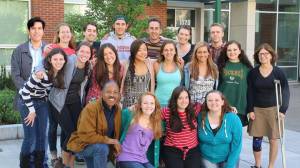
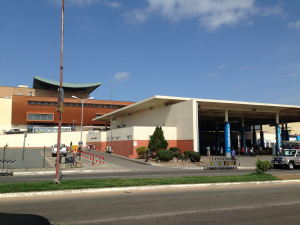
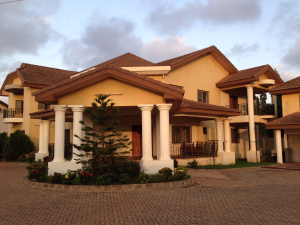
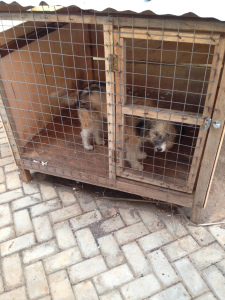



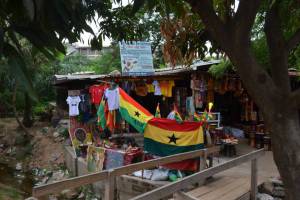


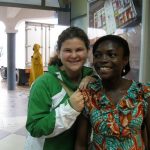

Comments by jaclynr